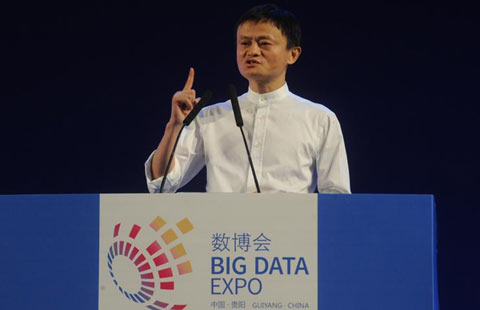New platform in Guizhou to offer big data as a commodity
(China Daily) Updated: 2015-05-28 13:31In the office of the world's first big data exchange market in Guiyang, capital city of Guizhou province, Wang Sanshou, CEO of the Global Big Data Exchange Co, is occupied with meetings that focus on how to better sell data as a type of commodity.
"This is a brand new business model, but since going operational last month, our platform has completed more than 2,700 deals, with turnover topping 13 million yuan ($2.1 million)," Wang said.
Currently, the exchange market has more than 130 member companies and boasts a wide range of data from various sectors, including transportation, health, financing and local governments.
"This is just a start. In five years, the exchange market will blossom into a national platform with about 10,000 members and the average daily transaction value is expected to exceed 10 billion yuan," Wang said.
To protect privacy, Wang said, all data have to be scrubbed and further analyzed to remove personal references before they become available on the platform. "We never sell underlying raw data."
The data exchange platform is part of Chinese tech-companies' efforts to tap the potential of big data as the sector is widely expected to see rapid growth even as economic growth slows in China.
According to a report by Internet consultancy firm International Data Corp, the Chinese market for big data technology and services will hit $617 million in 2016, roughly eight times the figure in 2011.
On Tuesday, Chinese Vice-Premier Ma Kai called for more efforts to explore the commercial value of big data at the opening ceremony of the Guiyang International Big Data Summit, which will end on Friday.
Deeming big data a basic resource and a major productive force in the new era, Ma said the government will roll out more policies to help speed up the monetization of cutting-edge technology.
Edward Tian, founder of AsiaInfo Holdings Inc, which is one of the investors in the exchange platform, said: "China has always been a follower of the latest trend, but now as the first one to dip its foot in the water of big data exchange, we must shoulder more responsibilities."
Wang agreed. At a big data exchange forum held on Tuesday, Wang's company, partnering with important industry players and research institutions, released a white paper that aims to set a standard for the development of the nascent sector.
The 20,000-word convention stipulates in detail what types of data are allowed to be exchanged on the platforms, how to punish companies that violate rules and what part governments can play in regulating the industry.
"This is more of a self-disciplining effort," Wang said. "I hope governments could move fast to roll out official regulations. This is the only way that the big data exchange market has an opportunity to thrive."
Foxconn uses database to launch finance operation
Foxconn Technology Co Ltd is moving into finance by leveraging the big data boom in China.
Founder and Chairman Terry Gou said on Tuesday: "We are looking to offer financial services to our suppliers by taking advantage of the massive data we have collected over decades of manufacturing gadgets."
Calling this business model "supply chain finance", Gou said the company aims to help its suppliers make decisions, gather data and manage their cash flow.
"Big data can reveal whether suppliers are running out of steam. If they are, we can quickly see this and tell them to downsize inventory to help reduce costs."
Last year, Foxconn's transactions as both a vendor and purchaser amounted to $200 billion, and that activity yielded a vast collection of data.
"If our suppliers have good credit, we can provide financing to them at lower rates than banks charge," he said.
In 2013, the Taiwan-based company set up a financial unit in Shanghai to offer such services, but it is still in the process of applying for the necessary licenses.
Gou made the comments on a bus trip to his company's big data center in Guiyang, the capital of southwestern Guizhou province. In 2014, Foxconn signed a comprehensive partnership deal with Guizhou. The company, which churns out gadgets for Apple Inc, promised to set up big data centers and help develop Guizhou into an important handset manufacturing base by 2017.
In the first quarter of 2015, the industrial park built by Foxconn in Guiyang achieved a revenue of 227 million yuan ($37 million).
- Deutsche Bahn to expand procurement from China
- China's Belt and Road Initiative to boost Turkey's economy: expert
- China to accelerate transport investment
- Hanergy Thin Film owner says talk of regulatory probe is 'purely rumor'
- China issues guideline for agricultural development
- Easier trade procedures to energize cooperation
- Pedal power helping to drive Internet innovation
- Making it big in China's Silicon Valley

















